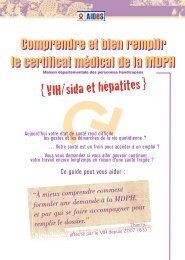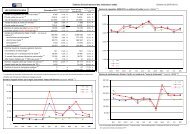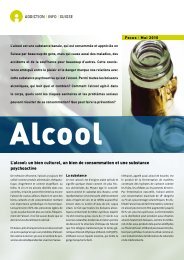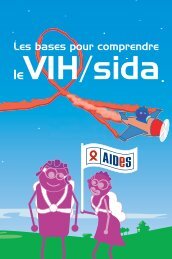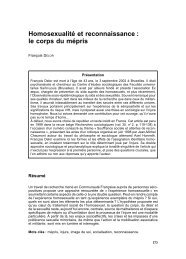Care and support for people living with HIV/AIDS
Care and support for people living with HIV/AIDS
Care and support for people living with HIV/AIDS
You also want an ePaper? Increase the reach of your titles
YUMPU automatically turns print PDFs into web optimized ePapers that Google loves.
Report on the global <strong>HIV</strong>/<strong>AIDS</strong> epidemic – June 2000ing drug users in Quebec City, Canada, the prevalence of <strong>HIV</strong> infection was close to30% among users who were also sex workers <strong>and</strong> just under 10% among men whodid not report sex work.Despite the great uncertainties about the number of injecting drug users <strong>and</strong> the proportionalready infected <strong>with</strong> <strong>HIV</strong>, enough is known to move ahead quickly <strong>with</strong> comprehensiveprogramming that can help reduce the high risk of new infections. Thismust include the primary prevention of drug use, especially among young <strong>people</strong>,<strong>and</strong> <strong>HIV</strong> prevention activities among drug users.Reducing <strong>HIV</strong> transmission among drug users: interventions areeffective but not politically popularIf large-scale, comprehensive <strong>HIV</strong> prevention programmes can be implementedamong injecting drug users be<strong>for</strong>e the prevalence rate exceeds 5%, infections canbe contained at a low level. Such programmes should include <strong>AIDS</strong> education, condompromotion, needle exchange <strong>and</strong> drug treatment. These comprehensive programmesare sometimes referred to as “harm reduction”. Yet the term “harm reduction”is politically sensitive, <strong>and</strong> some aspects of the approach are also politicallysensitive in most countries. For example, at least six government-funded studies of<strong>HIV</strong> infection among drug users in the United States concluded that needleexchange programmes significantly reduce new <strong>HIV</strong> infections among drug users,<strong>with</strong>out encouraging drug use. Despite these results, however, federal funding ofneedle-exchange programmes is still prohibited because of political opposition. Inone study it was estimated that failure to implement widespread needle-exchangeprogrammes in the United States between 1987 <strong>and</strong> 1995 will cost the country atleast US$ 244 million in medical care <strong>for</strong> <strong>HIV</strong> cases that could have been prevented.Harm reduction programmes, especially those aimed at preventing <strong>HIV</strong> infection,have been shown to work in transitional economies as well as in high-income countries.In Belarus, an <strong>HIV</strong> prevention programme among drug users in Svetlogorsk,which included education about safe injecting <strong>and</strong> safe sex <strong>and</strong> which providedclean syringes, seems to have led to far safer behaviour among drug users. In 1997,be<strong>for</strong>e the prevention programme began, 92% of those surveyed said they sharedsyringes. By 1999, this percentage had dropped precipitously to 35%. While some<strong>people</strong> did continue to reuse syringes, the proportion who cleaned them be<strong>for</strong>eusing them again rose to 55%, from just 16% be<strong>for</strong>e the prevention campaign. Theprevention project also included distribution of condoms to help reduce <strong>HIV</strong> transmissionfrom infected drug users to their sex partners. And the users appear to betaking advantage of them: by 1999 nearly two-thirds said they sometimes or alwaysused condoms, twice as many as two years earlier. The programme, which costaround US$ 0.36 per disposable syringe distributed, is estimated to have preventedover 2000 cases of <strong>HIV</strong> infection by its second year of operation, at a cost of aroundUS$ 29 per infection prevented – far below the cost of an <strong>AIDS</strong> case to a family ora health system.76



